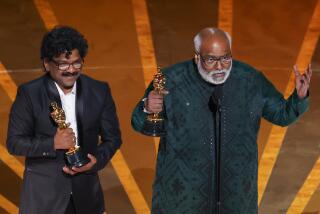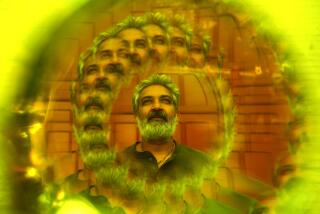KEEPING SCORE
It was only fitting that “Slumdog Millionaire,” a British film graced by Bollywood stars, would feature India’s star film composer, A.R. Rahman. At 42, the modest maestro has been credited with a staggering number of achievements: scoring more than 100 movies, selling more than 200 million albums and making traditional music cool to Indian youth.
Because his songs and soundtracks effortlessly blend Indian and Western influences, Rahman has had a string of hits, making him as well known as, say, composer John Williams (though Williams probably doesn’t have a league of obsessed Japanese fans following his concerts). By phone from India, Rahman says that the dramatic, sweeping nature of “Slumdog Millionaire” and its rags to riches story spanning about 15 years led to the wide variety of music composed. “We had everything from the typical Indian ‘80s music to more futuristic sounds . . . in one sequence, we wanted it to sound like a space shuttle taking off.”
Normally based out of his home studio and music conservatory in Chennai, India, Rahman composed “Slumdog” in a whirlwind two months in London. Using the Apple-based Logic Pro digital audio workstation to lay down ideas for director Danny Boyle, he spun notes together that spring to life in the film’s emotional arcs. Sunlight on a face or a panoramic city view elicits the spare, singing notes of a sitar. During a mad pursuit through the slums, his violins slice like Bernard Herrmann’s in “Psycho.” Another heart-stopping sequence called “Escape” pulses with energy, in step with the sound of a rapidly approaching train.
“Danny was very specific in his ideas. He wanted to hear percussion, a singing voice,” Rahman says. For a sequence featuring two young boys running from the police, Rahman collaborated remotely with British-Sri Lankan artist M.I.A., e-mailing vocal and instrumental takes back and forth, resulting in the song “O . . . Saya.” And Rahman’s “Jai Ho” (May You Win) gets the whole cast dancing.
“I take music very seriously. If it’s not done, it doesn’t leave the studio.”
-- Monya De
More to Read
The biggest entertainment stories
Get our big stories about Hollywood, film, television, music, arts, culture and more right in your inbox as soon as they publish.
You may occasionally receive promotional content from the Los Angeles Times.










